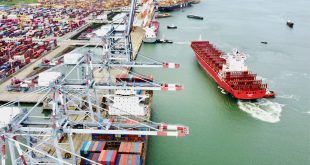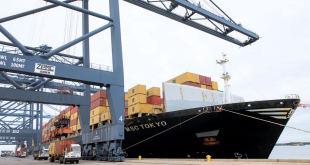35 years after Vietnam and the Philippines established diplomatic ties, the bilateral relations have thrived in most areas like politics, economy, trade and investment, science, technology, agriculture and fisheries.
Commercially, the two-way trade has increased steadily year after year, from US$541 million in 2000 to around US$2.2 billion in 2008, of which Vietnam’s exports accounted for US$1.8 billion (US$1.17 billion from rice export) and its imports from the Southeast Asian partner were valued US$400 million, fulfilling the target of US$2 billion set for 2010 ahead of schedule. Due to the economic and financial crisis, the bilateral trade turnover reached US$1.5 billion in the first nine months of 2009, of which Vietnam earned US$1.17 billion from its exports (down 25 percent year on year) and spent US$310 million on imports from the Philippines (up 6.2 percent over the same period of a year earlier).
In 2010, the two-way trade revenue topped US$2.4 billion, of which Vietnam exported US$1.7 billion worth of goods to the regional nation. The two countries agreed to strengthen trade promotion measures, aiming to bring the two-sided trade value to US$3 billion or more in 2016. Vietnam and the Philippines are promoting investment measures to increase investment in each other and share experience in public private partnership (PPP) investment mode.
Vietnam’s major exports to the Philippines include agricultural products and electronics components while it primarily imports fertilisers, machine parts, minerals, liquefied petroleum gas, petroleum products, pharmaceuticals and building materials from the Philippines.
Rice is the most important export of Vietnam to the Philippines in the past years as it accounts for 60 – 70 percent of total export turnover. Vietnam averagely exports from 1.5 – 1.7 million tonnes of rice a year to the Philippines. It shipped nearly 637,000 tonnes of rice worth US$307 million to the Philippines in the first six months of 2011.
On investment, the Philippines’ investment in Vietnam remains modest. At present, it has 55 investment projects with a total investment of US$275 million in Vietnam, ranking 26th amongst 88 countries and territories investing here. In the first six months in 2011, the Philippines had three fresh investment projects worth US$1.33 million in Vietnam. In July 2008, Vietnam agreed to allow the Philippines to establish the Investment and Trade Centre in Ho Chi Minh City to explore the market and seek investment opportunities in Vietnam for Philippine enterprises. The centre is now affiliated to the Philippine Embassy in Hanoi and operating on non-profit principle.
Sea cooperation is a primary concern of the two countries. In recent years, the sea cooperation between Vietnam and the Philippines has been constantly strengthened and expanded in various fields: joint oceanographic and maritime scientific research (JOMSRE), joint marine seismic undertaking (JMSU), naval cooperation, search and rescue, oil spill response, fishing, marine meteorology. They also coordinated and shared standpoints on international and regional arenas. At the 6th session meeting of the Vietnam – Philippines Joint Commission for Bilateral Cooperation (JCBC) held in Hanoi from October 5 to 7, the two sides agreed to sign an agreement on establishment of communication lines, increase liaison between the two navies and establish a hotline between the Vietnam Maritime Police and the Philippines Coast Guard. In addition, the Philippines pledged to consider the abolition of regulations on visas or supervision over Vietnamese sailors as well as the lifting of different taxes on Vietnamese ships which transport export goods from the Philippines.
On agriculture, the cooperative relationship between Vietnam and the International Rice Research Institute (IRRI) in Philippines was established in 1968. At present, up to 60 – 70 percent of rice areas in Vietnam are applied with advanced rice cultivation techniques and rice varieties originated from the IRRI. The IRRI has funded more than 600 researchers in Vietnam. On average, the IRRI annual sends more than 100 scientists and researchers to Vietnam and admits 60 – 70 Vietnamese scientists to study and work. Vietnam has contributed more than US$600,000 to the IRRI, funded by the Australian Government.
Education is a potential field of cooperation. Presently, some 500 Vietnamese students are studying at university, master and doctorate degrees in the Philippines and the number is on the fast rise.
In the coming time, the two countries will soon sign the Vietnam – Philippines Action Plan for the 2011 – 2016 period.
Source: Vietnam Business Forum
 Vietnam Seaports Association
Vietnam Seaports Association




